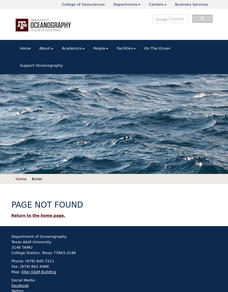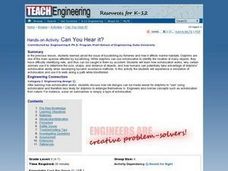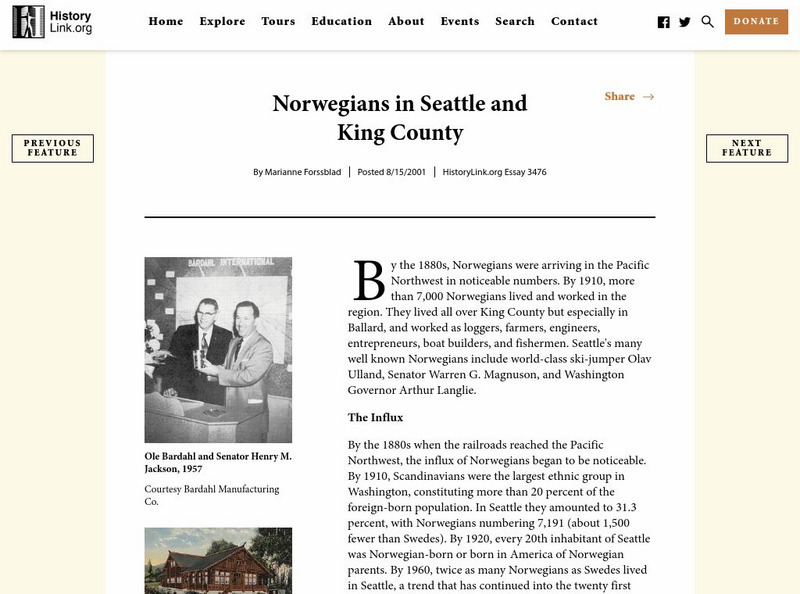Curated OER
Fishing for Solutions
Learners investigate the many ecological and economic issues related to over fishing the world's marine resources. Working in committees, students research the related topics of equipment and fishing techniques.
Curated OER
Tale of a Tuna
Junior marine biologists access the International Commission for the Conservation of Atlantic Tunas' data on Atlantic Bluefin Tuna catches. As they analyze the data, they answer three questions. Background information and links to...
Curated OER
Food Chain
Young scholars explore the cycle of how each living thing gets food. In this food chain unit, students participate in four lesson plans that highlight animal vocabulary, habitats, and the role of humans in our ecosystem. Young scholars...
Curated OER
Management of Commercial Fisheries, Part 2
Students examine the differences between the past vs. the present fishing and the uses of fisheries. For this investigative lesson students complete a worksheet and learn to think critically in order to protect our environment.
Curated OER
Shoal Destroying
Learners investigate methods used in the fishing industry. In this environmental stewardship instructional activity, students visit selected websites to research fishing methods and create a game based around the fishing industry.
Curated OER
Management of Commercial Fisheries
Students examine the differences between renewable and nonrenewable resources and study about past fisheries. In this fishery lesson students explore the complexity of a fishery and its management.
Curated OER
Management of Commercial Fisheries, Part 3
Pupils search the Internet and write a research paper on the environment. In this investigative lesson students develop a paper on fisheries and management of them.
Curated OER
Sea Connections: Marine Ecosystems
Students identify producers and consumers from marine ecosystems and describe the balance among them in the environments. After constructing a food chain from a marine ecosystem, they examine human activities that can upset the balance...
Curated OER
Fisheries
Students research and report on the ocean's problems of disappearing or diminishing species around the world. students examine ecosystems and food chains and present their findings to a mock panel of science experts.
Curated OER
Technology as Change: The Atlantic Canada Fishery
Ninth graders use the internet to research the history of the Atlantic Canada Fishery and how it was different from today. Using this information, they write a research paper and share it with their classmates. In groups, they...
Curated OER
Can You Hear It?
Pupils work together to discover the concept of echolocation. They examine dolphins and their behaviors. They discuss how humans could use this information to help them in their everyday lives as well.
Curated OER
Gone Fishing
Students examine the effects of various methods of fishing on fish populations and biodiversity. They read a handout, participate in a simulation of different fishing methods, record the results, and answer discussion questions.
Curated OER
Feeling Crabby?
Young scholars analyze data to investigate the influence of water depth on size among deep-water crabs. They interpret results from this data, and apply the results regarding appropriate fishery regulations.
Curated OER
The Fish Trade
Students read a series of articles on the increasingly international business of aquaculture. They answer questions and discuss the readings. They, in groups, read further articles and present summaries to the class.
Mariners' Museum and Park
Mariners' Museum: Watermen of the Chesapeake
In this resource, students can meet the modern-day watermen of the Chesapeake Bay region. Find out about their day-to-day struggles with living and working within the nation's largest estuary system.
Travel Document Systems
Tds: Mali: Economy
A comprehensive and current look at the economy of Mali from the U.S. State Dept. Background Notes. Read about the development of agriculture and mining in this third world country.
Mariners' Museum and Park
Mariners' Museum: Chesapeake Bay: Our History and Our Future
Learn about the culture, history, and ecology of the Chesapeake Bay estuary. Follow activities of the Bay through time to learn how it has been an important part of our country's past and present times. Also find out why it is important...
Library of Congress
Loc: Sea Changes in a Community
A lesson plan dealing with the fishing industry in New England and native and immigrant fishermen, and government legislation.
Virtual Museum of Canada
Virtual Museum of Canada: Community Stories: Windows on the Past: A Virtual Tour of Mahone Bay
The history of Mahone Bay, Nova Scotia is viewed through original documents and photos as well as personal stories. This town was once the centre of Grand Banks fishing, privateers, and rum running!
Scientific American
Scientific American: Study Questions Wisdom of Harvesting Only the Largest Fish
This article, published by Scientific American (July 9, 2002), highlights a new study which questions the wisdom of harvesting only the largest fish. This "selective extraction" may be causing wild fish to shrink over time.
Read Works
Read Works: Hook, Line, and Sinker
[Free Registration/Login Required] An informational text about the depletion of edible seafood populations. A question sheet is available to help students build skills in reading comprehension.
History Link
History Link: Norwegians in Seattle and King County
Engaging discussion of the role Norwegians have played in the evolution of Seattle and King County. An interesting parallel is drawn between the geography and climate of Seattle with that of Norway, thus indicating why so many Norwegians...





















